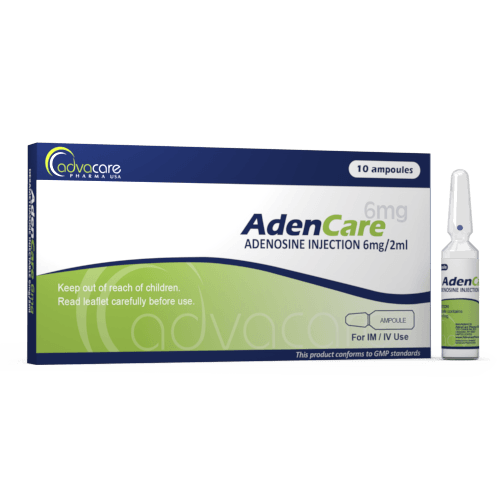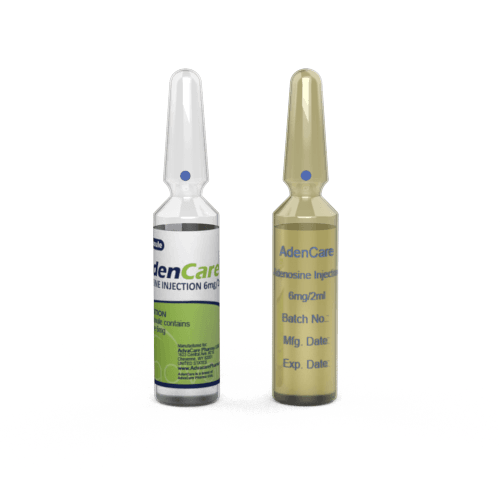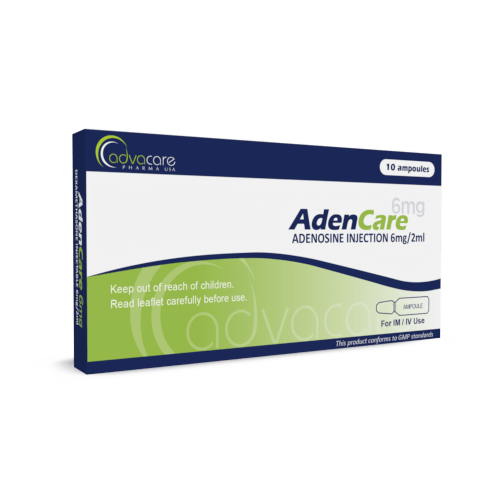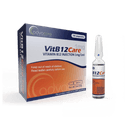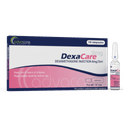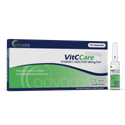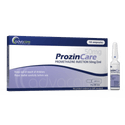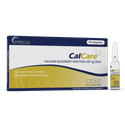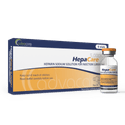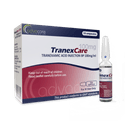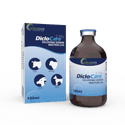- Home›
- Pharmaceuticals›
- Injections›
- Small Volume Injections›
- Adenosine Injection
Adenosine Injection
Dosage
Packaging
What is Adenosine?
Active Ingredients: Adenosine
Adenosine Injection is a drug used in the treatment of angina, chronic diseases, acute myocardial infarction, myocarditis, heart failure, sick sinus syndrome, coronary heart disease, and cardiogenic shock. It is also used in the supplementary treatment of arrhythmia.
Adenosine is an organic compound called a purine nucleoside base. It serves as the foundation for adenosine triphosphate (ATP), a vital molecule for energy transfer within cells.
This drug was first described in 1931, and its vasodilating effects were described in the 1940s. It was approved and granted by the FDA in 1989. It is mainly indicated as an adjunct to thallium-201 in myocardial perfusion in patients with reduced exercise abilities. It can convert the sinus rhythm of paroxysmal supraventricular tachycardia.
This drug functions by slowing the conduction time through the A-V node and can interrupt the reentry pathways through the A-V node. It can restore the normal sinus rhythm in patients with paroxysmal supraventricular tachycardia (PSVT).
This drug can be antagonized by methylxanthines like caffeine and theophylline. This drug is not blocked by atropine. When administered intravenously, the dose of 6 to 12mg does not have systemic hemodynamic effects. Large doses can decrease blood pressure by decreasing peripheral resistance.
Intravenous administration leads to rapid clearance from the circulation via cellular uptake by erythrocytes and vascular endothelial cells. This process involves a specific transmembrane nucleoside carrier system characterized by its reversibility, lack of concentration, and bidirectional symmetry. Intracellular adenosine undergoes rapid metabolism, either through phosphorylation to adenosine monophosphate catalyzed by adenosine kinase or through deamination to inosine facilitated by adenosine deaminase in the cytosol. This results in deamination playing a significant role only when cytosolic adenosine saturates the phosphorylation pathway. Inosine, formed through adenosine deamination, can exit the cell intact or undergo degradation to hypoxanthine, xanthine, and, ultimately, uric acid. Adenosine monophosphate, formed through adenosine phosphorylation, becomes part of the high-energy phosphate pool. Extracellular adenosine is predominantly cleared by cellular uptake with a half-life of less than 10 seconds in whole blood, and excessive amounts may undergo deamination by an ecto-form of adenosine deaminase. Adenosine activation or inactivation does not rely on hepatic or renal function. This means that hepatic and renal failure is not expected to impact its effectiveness or tolerability. This drug is mostly eliminated in urine as uric acid. Adenosine is not effective in converting rhythms other than PSVT, such as atrial flutter, atrial fibrillation, or ventricular tachycardia, to normal sinus rhythm.
AdvaCare Pharma is a producer and exporter of Adenosine Injection. This medicine is produced in our GMP-certified facilities in China, India, and the USA. These facilities are routinely audited to ensure they comply with health, safety, and environmental standards.
Why are we a leading Adenosine manufacturer?
AdvaCare Pharma, a US-owned pharmaceutical company, is a manufacturer of Adenosine Injection with GMP-compliant manufacturing facilities located worldwide. We conduct frequent GMP, third-party and internal facility inspections to ensure that our manufactured injectable treatments exceed the stringent requirements of importing countries and our distributors.
As a renown Adenosine manufacturer and global supplier of 120+ pharmaceutical injection products, our global reach extends to over 65 markets ensuring that pharmaceutical distributors, hospitals, pharmacies, NGOs and government institutions receive the quality-assured treatments they need.
Uses
What is Adenosine used for?
It is used to treat arrhythmia (abnormal heart rate). Adenosine can facilitate the conversion of paroxysmal supraventricular tachycardia (PSVT) to sinus rhythm. It is also used for a diagnostic test called a stress test (myocardial perfusion imaging).
How are Adenosine Injections used?
This medication is manufactured as a solution to be injected into a vein. It should be administered by a healthcare professional in a hospital or clinic setting. Prior to administration, it is advisable to ensure sterile conditions.
What dose should be given?
Recommended dosage guidelines may vary depending on medical condition:
- For paroxysmal supraventricular tachycardia (PSVT) conversion, the usual first dose is 6mg, given by IV. Then, administer a dose of 12mg over a period of 1 to 2 minutes, as necessary for 1-2 times.
- For PSVT conversion in pediatric patients weighing less than 50kg, the usual dose is 0.05-0.1mg/kg per dose, given IV. The dose can be increased by 0.05-0.1mg/kg every 1-2 minutes as needed. The maximum dose is 0.3mg/kg or 12mg per dose.
- For ACLS tachycardia, the usual first dose for adults is 6mg, given by IV. Then, administer a dose of 12mg over a period of 1 to 2 minutes, as necessary for 1-2 times.
- For PALS tachycardia in pediatric patients, the usual dose is 0.1mg/kg per dose, given IV. If necessary, a second dose of 0.2mg/kg can be administered.
- For myocardial perfusion imaging, the usual dose is 140mcg/kg of body weight per minute, given by IV every 6 minutes.
The dosage is based on medical condition, response to the treatment, age, and weight. Refer to a doctor or pharmacist for guidelines on dosage. Do not exceed what they advise.
Can Adenosine Injection be given to pregnant women?
This drug belongs to the pregnancy category C, but it should be used with caution and should be added only if the benefits outweigh the risks.
Can this drug be administered during breastfeeding?
This drug has the potential for serious adverse reactions in infants. If the mother should take this drug, breastfeeding should be avoided.
Can Adenosine Injection be given to pediatric patients?
Yes, this drug can be used in pediatric patients for the treatment process of paroxysmal supraventricular tachycardia in neonates, infants, adolescents, and children. This drug is indicated as an adjunct to thallium-201 myocardial perfusion scintigraphy in patients unable to exercise adequately. It is used for the stress test in patients.
Can Adenosine Injection be given to geriatric patients?
This drug should be used with caution in the older population because they are prone to heart diseases and diminished cardiac function. There are changes in the dose adjustment in young and old populations.
Other warnings
Patients with serious arrhythmias should not receive high doses of Adenosine because the drug has a very short half-life, and the effects are self-limiting. Concomitant use of digoxin and verapamil is contraindicated because this drug combination can lead to transient and prolonged episodes of asystole and fatal outcomes.
Upon administration of Adenosine, a conversion to a normal sinus rhythm typically occurs, accompanied by the appearance of various new rhythms on the ECG. These findings occur in approximately 55% of patients and last only a few seconds.
This drug might cause respiratory alkalosis because it increases minute ventilation and reduces arterial PCO2. Adenosine should be used with caution in patients with obstructive lung diseases and should be avoided in patients with bronchoconstriction and bronchospasm (asthma). This medication should be discontinued if patients develop respiratory difficulties.
Side Effects
As with all pharmaceuticals, some unwanted effects can occur from the use of Adenosine Injection.
Common side effects include, but may not be limited to:
- breathing problems
- chest pain
- lightheadedness
- discomfort in the chest, jaw, neck, or throat
Serious side effects may include: • signs of an allergic reaction
The most common side effects with over 10% occurrence are:
- flushing
- dyspnea
Side effects with occurrence from 1-10% are:
- chest pressure
- dizziness
- lightheadedness
- nausea
- numbness
The half-life of this drug is very short, and the adverse effects are generally self-limiting. Intake of caffeine products can limit the Adenosine function and might lead to no successful effect.
For a comprehensive understanding of all potential side effects, consult a medical professional.
If any symptoms persist or worsen, or you notice any other symptoms, please call your doctor.
Precautions
Do NOT use Adenosine Injection if: • You are allergic to any of the ingredients.
Before treatment, consult your doctor regarding any medications you are taking to address potential drug interactions.
The dosage of this drug should be proper and adjusted according to the patient because an overdose might occur. Overdose should be treated with symptomatic and supportive care. In some cases, theophylline injections are necessary for the treatment of overdose effects. The main signs of an overdose of Adenosine are cardiac ischemia, heart block, or asystole.
This drug should not be used in cases of:
- sinus node disease (sick sinus syndrome or symptomatic bradycardia)
- second or third-degree A-V block
- hypersensitivity to Adenosine.
This drug should not be combined with Dipyridamole because it can decrease the breakdown of Adenosine, which might lead to heart problems. Patients should inform their doctors if they consume Dipyridamole. Carbamazepine administration combined with Adenosine administration might lead to slow heart function. Adenosine Injection can slow down the function of Antigout drugs because it increases the uric acid in the body and can reduce the effectiveness of the drug. Methylxanthine drugs can block the effects of adenosine. Patients should stop drinking black tea or other caffeine products 24 hours before Adenosine administration. When this drug is used for the diagnostic stress test, patients should also limit the caffeine product intake.
This medication may not be suitable for people with certain conditions, so it is important to consult with a doctor if you have any health conditions.
References
Adenosine: electrophysiologic effects and therapeutic use for terminating paroxysmal supraventricular tachycardia
This study included 17 patients who were administered intravenously with adenosine; these patients underwent intracardiac electrophysiologic studies. This research revealed that at a mean dose of 179 +/- 88mg/kg (+/- SD), adenosine can suppress the sinus node automaticity and depress the atrioventricular nodal conduction.
The conclusion is that human sinus and AV nodes are sensitive to physiologic doses of adenosine and this injection can be safely and effectively used to terminate acute episodes of supraventricular tachycardia.

You might be interested in...
Why AdvaCare Pharma?
As an industry leader, we are aware of our responsibility to provide affordable and sustainable solutions to improve healthcare worldwide.
